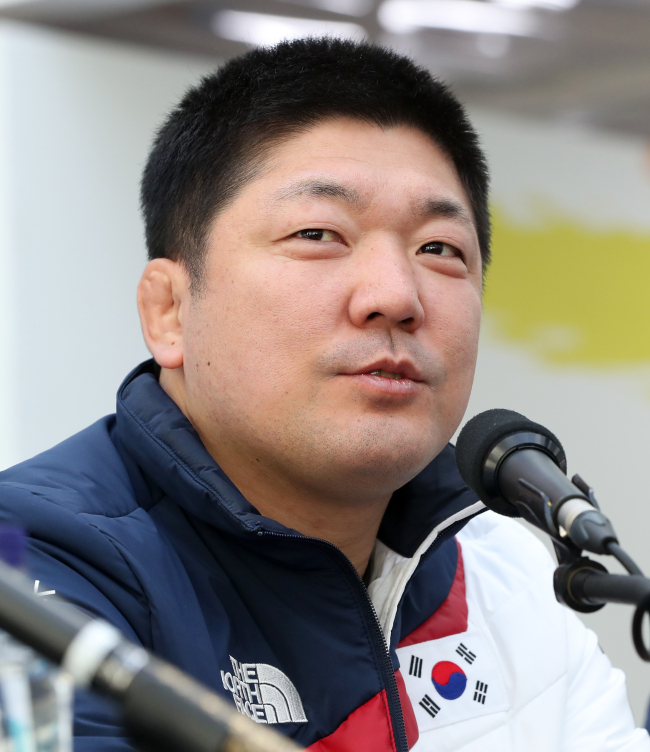South Korean national bobsleigh and skeleton team head coach Lee Yong on Saturday called for more financial support for snow sports, saying such backing can produce Olympic medalists like his pupil Yun Sung-bin.
Lee, who has been coaching bobsledders and skeleton sliders since 2011, said he burst into tears when Yun won the gold medal in the men's skeleton at the PyeongChang Winter Olympics on Friday, becoming the first Asian to stand on an Olympic podium in sledding sports. He said the 23-year-old slider's achievement was the result of the cooperative effort of all parties, including the Korean Sport & Olympic Committee and the Korea Bobsleigh & Skeleton Federation.
"We were thoroughly prepared for this Olympics," Lee said at a press conference at Team Korea House in Gangneung, Gangwon Province. "We were working together with the KSOC since May to find ways to win medals."
 |
South Korean national bobsleigh and skeleton team head coach Lee Yong. (Yonhap) |
Lee said he now hears the word "miracle" often considering his team's environment in the past. He said without financial support from the organizations and sponsors, he and his athletes wouldn't have made it this far.
"When I first took this job in 2011, I had only one coach and five athletes, but we were able to receive some support after we produced some meaningful results," he said. "Thanks to that support, now we have 10 homegrown coaches and trainers, and seven foreign coaches. Realistically, without money, you can't produce this result."
Lee said the government, sports organizations and other related parties should give similar support to other snow sports. Prior to Yun's victory, all 55 of the country's medals at the Winter Games came from only three sports: short track speed skating, speed skating and figure skating.
"There are lots of sports that are looking for support, and if the government can create a system to support them for about three to five years like it did for us, I'm sure we can see medals not only from skating or sledding sports but also from skiing," he said. "Beijing 2022 could be the next PyeongChang Winter Olympics. I hope we can see medals from snow sports."
Lee said South Korea can now be considered a power house in sledding sports but to maintain that position, the government also needs to find a way to manage the Olympic Sliding Centre in PyeongChang, Gangwon Province. The Olympic sledding sports venue is only one of the 16 tracks in the world that is approved by the International Bobsleigh and Skeleton Federation.
"We know that the organization that will manage (the Olympic Sliding Centre) after the Winter Games has yet to be determined," Lee said. "I believe the sport's future can develop with coordination between administrative work and on-site efforts. I hope people in the government can listen to advice from coaches and athletes regarding this matter."
Yun also agreed with Lee's idea that utilizing the Olympic Sliding Centre is important.
"We first need to find more talent (to develop this sport)," Yun said. "After that, we need some facilities to help them. But South Korea is now a country with a sliding track. We need to find a way to best utilize that facility." (Yonhap)








![[Weekender] Korea's traditional sauce culture gains global recognition](http://res.heraldm.com/phpwas/restmb_idxmake.php?idx=644&simg=/content/image/2024/11/21/20241121050153_0.jpg)